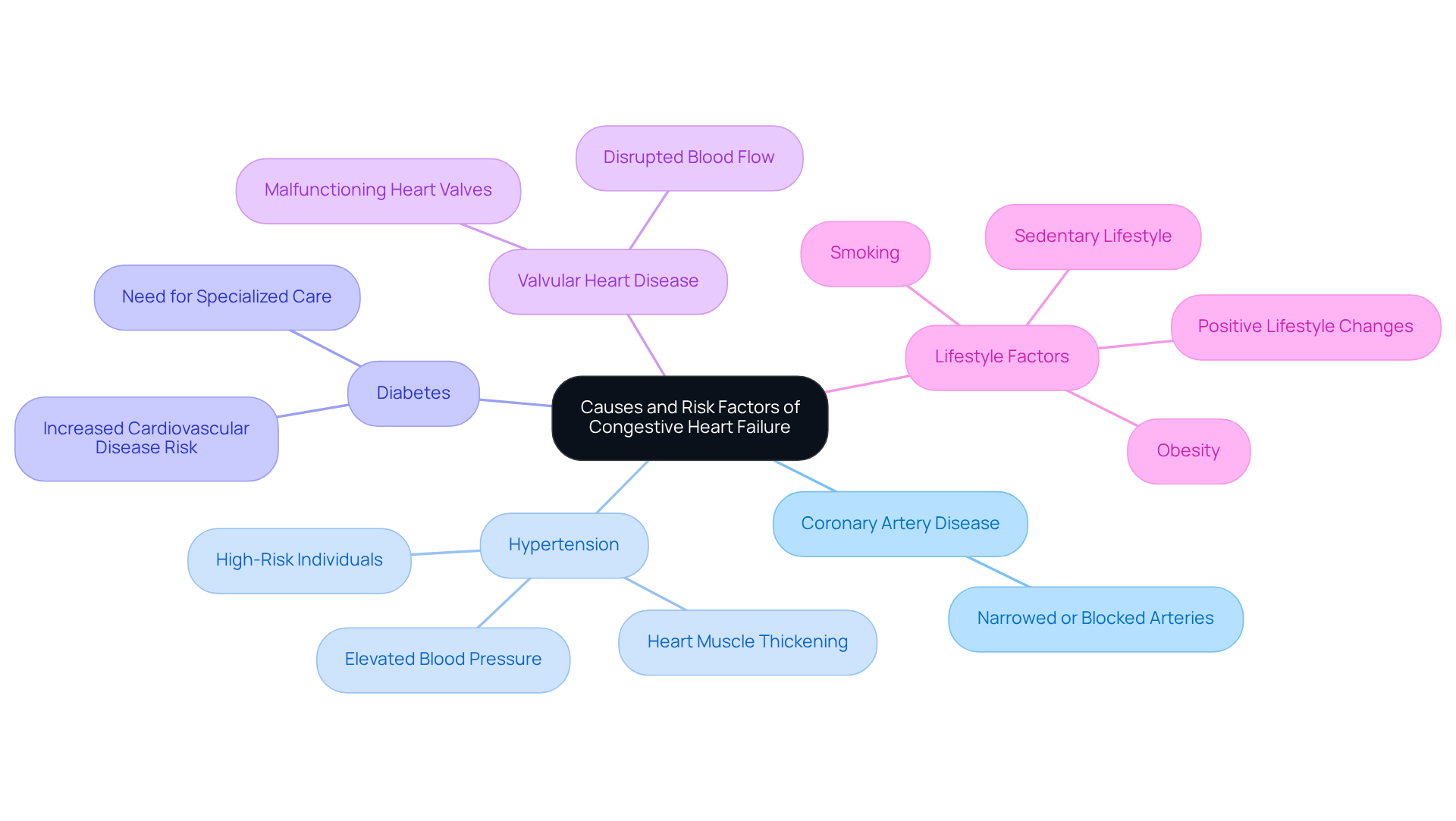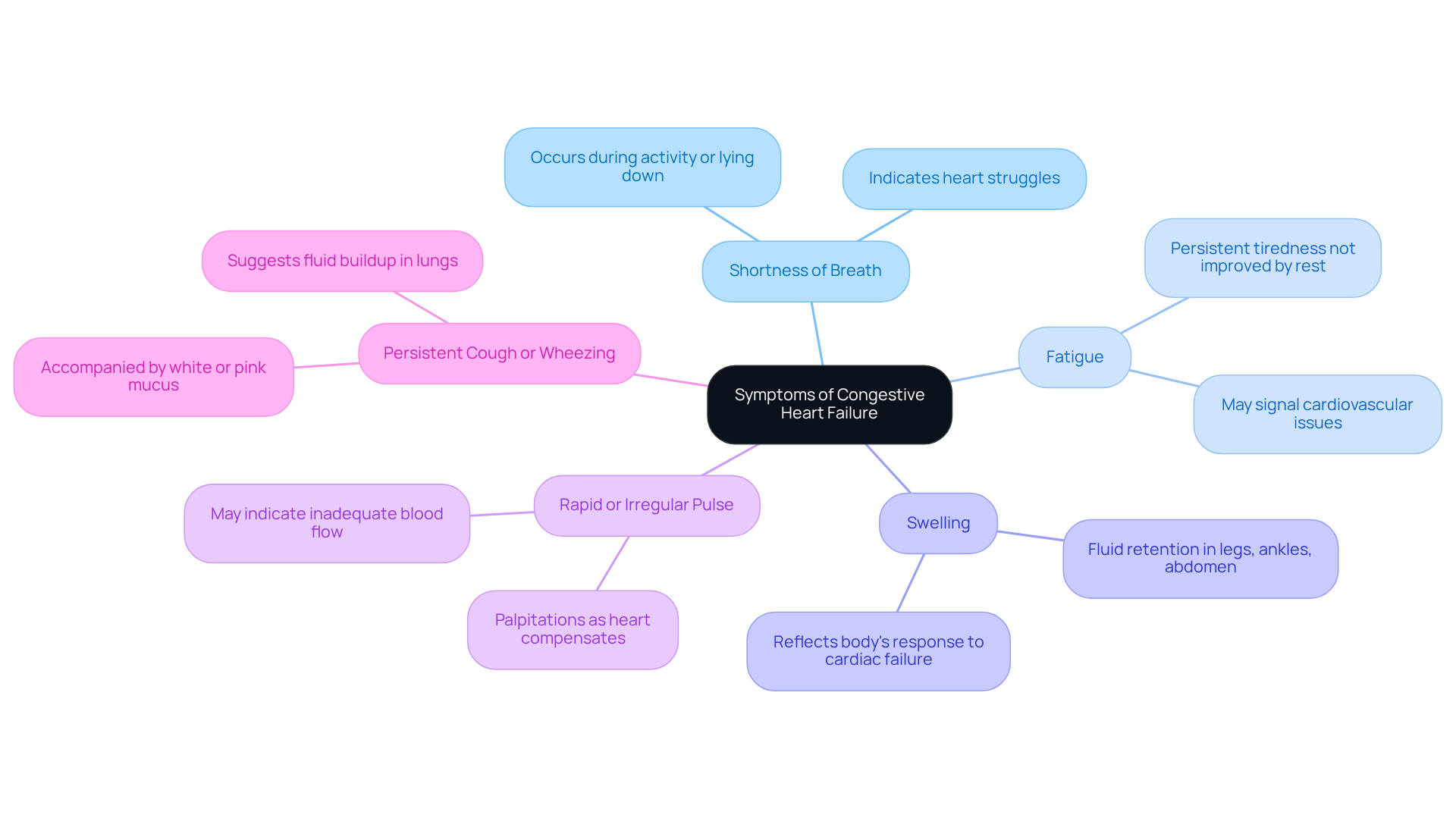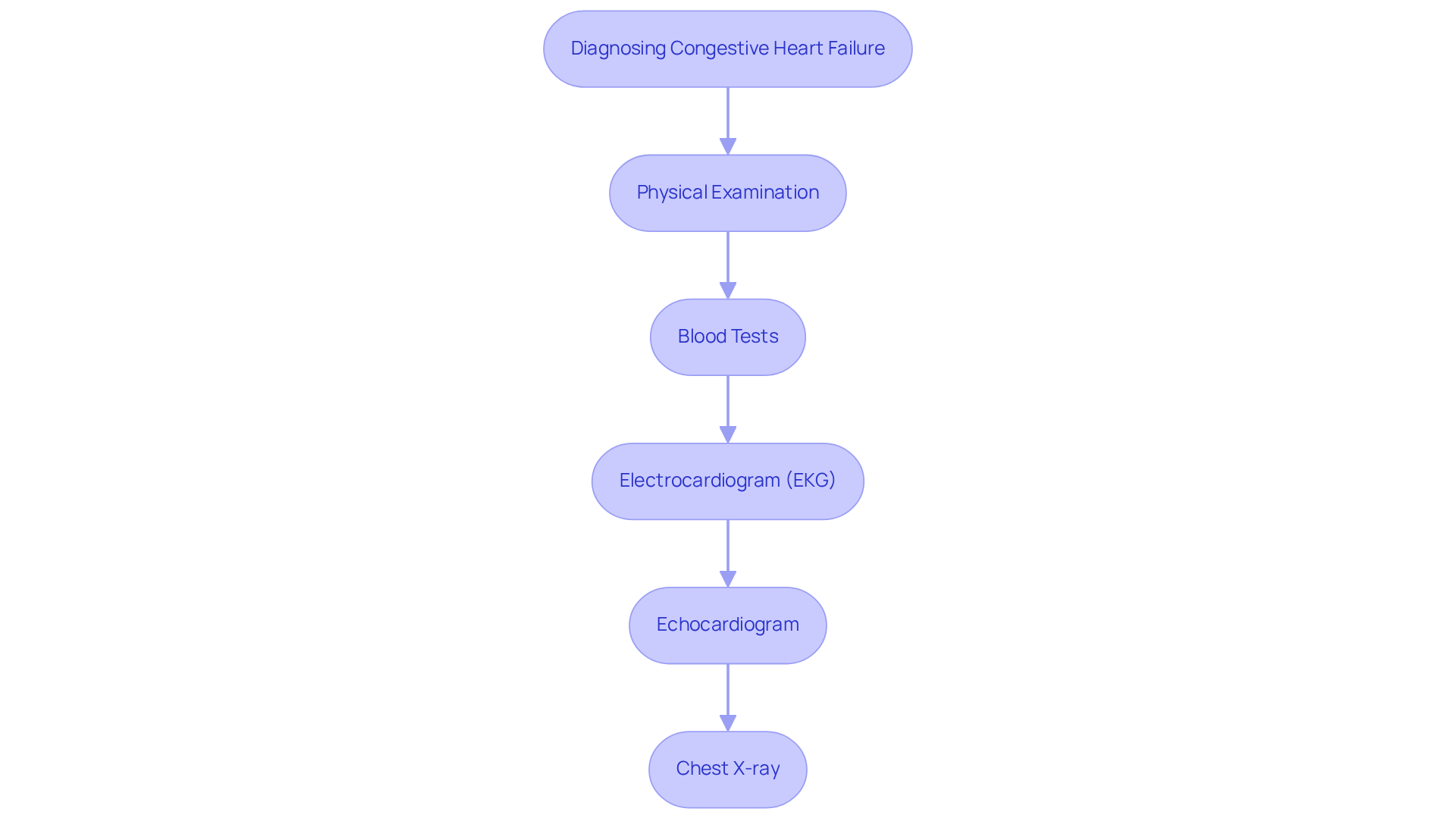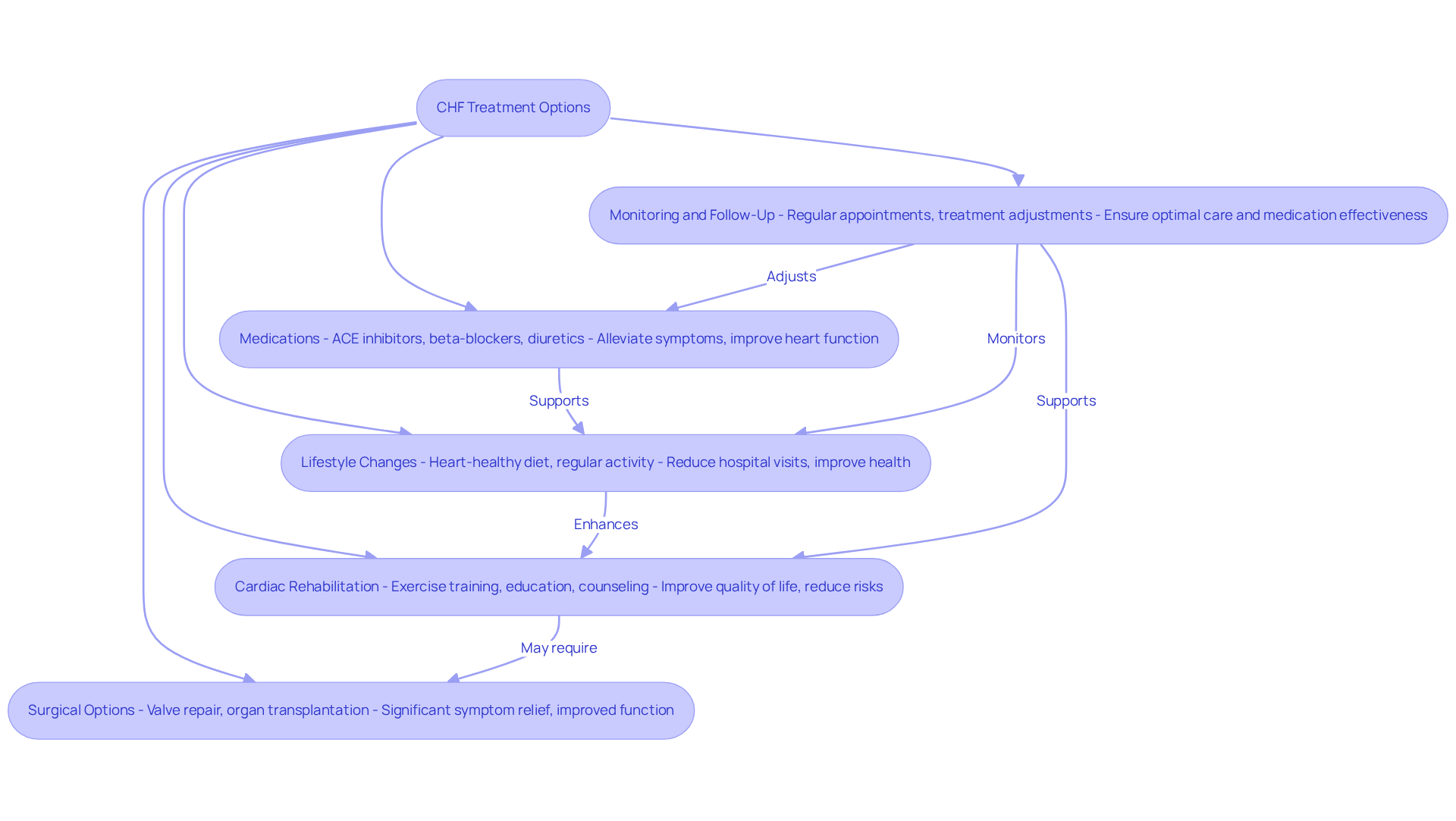


Managing congestive heart failure (CHF) can feel overwhelming, but there is hope and support available. Comprehensive treatment involves a multifaceted approach, which includes:
It's important to understand the various treatment options available to you.
One program that stands out is Amavita's CardioElite™, designed to enhance patient care through real-time diagnostics and tailored management strategies. This program not only aims to improve your quality of life but also strives to reduce the number of hospital visits you may experience.
We understand that navigating your health can bring up many emotions and concerns. Remember, you are not alone in this journey. Take the time to explore these options, and consider reaching out for support. Your well-being is our priority, and together, we can work towards a healthier future.
Understanding congestive heart failure (CHF) is crucial in a world where heart health is increasingly at risk. This complex syndrome not only affects the heart's ability to pump blood effectively but also significantly impacts overall well-being. As you navigate the challenges of CHF, you can gain valuable insights into its causes, symptoms, and the latest treatment options available.
What are the most effective strategies for managing this condition, and how can you empower yourself to take control of your heart health? Together, we can explore these important questions and find ways to support your journey toward better heart health.
Congestive heart failure (CHF) is a complex clinical syndrome that can deeply affect your well-being. It occurs when the heart struggles to pump enough blood to meet the body's needs for oxygen and nutrients. This condition may arise from various underlying issues, such as:
Understanding this condition is essential, as it can be categorized into two main types:
Recognizing these distinctions is crucial for effective diagnosis and treatment planning. If you or a loved one is experiencing symptoms, it’s important to seek help. You are not alone in this journey, and there are ready to support you. Remember, understanding your health is the first step towards feeling better.

Several factors can contribute to the development of congestive heart failure, and understanding these can be crucial for your health.
Understanding these causes and risk factors is essential for both you and your healthcare provider in . If you are seeking comprehensive cardiac evaluations, know that Amavita Heart and Vascular Health is here to support you every step of the way.

Common symptoms of congestive heart failure (CHF) can be concerning, and recognizing them early is crucial for your health. These symptoms often include:
Identifying these indications early is vital, especially for those at high risk, such as individuals with diabetes, hypertension, or a family history of heart disease. If you are monitoring your treatment or have had inconclusive standard testing, timely intervention can lead to better management and improved outcomes.
If you notice your condition worsening, if new issues arise, or if you experience a rapid weight gain of 5 pounds or more within a few days, please reach out to your healthcare provider. Recent research highlights that individuals who actively these concerns with their healthcare providers tend to receive better care and enjoy an improved quality of life. Consider a self-monitoring strategy, as it encourages you to consistently evaluate your condition and seek assistance when needed.
Healthcare professionals stress that understanding these signs is essential for effective communication with your medical team, ultimately leading to more personalized and effective treatment for congestive heart failure. Additionally, lifestyle changes such as weight loss, regular exercise, and reduced salt intake can significantly enhance the treatment for congestive heart failure.
At Amavita Heart and Vascular Health, we offer advanced imaging and comprehensive evaluations tailored to meet the specific needs of high-risk patients, ensuring you receive the most sophisticated treatment for congestive heart failure. Remember, you are not alone in this journey; we are here to support you every step of the way.

Diagnosing congestive heart failure (CHF) often involves a thoughtful combination of procedures designed to address your concerns and symptoms.
These diagnostic tools are essential for determining the presence and severity of CHF, which guides us in making informed decisions regarding the treatment for congestive heart failure. At Amavita Heart and Vascular Health, we understand how fatigue and breathlessness can affect your daily life. We provide thorough cardiac assessments to identify specific reasons for these symptoms, which allows us to develop , including treatment for congestive heart failure, aimed at enhancing your cardiovascular function and rejuvenating your energy levels. Remember, you are not alone on this journey; we are here to support you every step of the way.

Effectively managing treatment for congestive heart failure (CHF) requires a compassionate and comprehensive approach, tailored to meet individual needs. At the heart of this is Amavita's CardioElite™ program, designed to enhance care and support. Understanding your options can make a significant difference in your journey towards better health.
Medications are often a cornerstone of the treatment for congestive heart failure. Commonly prescribed medications, such as ACE inhibitors, beta-blockers, and diuretics, are vital in the treatment for congestive heart failure, as they help alleviate symptoms and improve heart function. These medications are an effective treatment for congestive heart failure, helping to reduce fluid retention, lower blood pressure, and enhance the heart's pumping capacity, leading to better outcomes. With the , you benefit from advanced, real-time diagnostic information and 24/7 cardiology consultations, empowering proactive management of your health.
In some advanced cases of CHF, treatment for congestive heart failure may necessitate surgical options, such as valve repair or organ transplantation. These interventions can provide significant relief from symptoms and improve overall heart function, offering hope for a better quality of life.
By understanding these treatment options, particularly the treatment for congestive heart failure and the added benefits of the CardioElite™ program, including its AI integration and AHA certification, you can take an active role in your healthcare. Engaging with your healthcare providers to develop personalized management strategies can enhance your quality of life and effectively control your condition. Remember, you are not alone on this journey; support is always available.

Understanding congestive heart failure (CHF) is vital for anyone affected by this complex condition. Recognizing the symptoms, identifying the causes and risk factors, and exploring effective diagnostic procedures and treatment options are essential steps. By gaining insight into CHF, individuals can take proactive steps towards managing their health and improving their quality of life.
Key arguments presented include:
Furthermore, the comprehensive overview of diagnostic procedures underscores the importance of early detection. The exploration of treatment options, including medications and cardiac rehabilitation, emphasizes the multifaceted nature of managing CHF. The support offered by programs like Amavita's CardioElite™ further enhances the ability to navigate this journey.
Ultimately, it is essential for individuals to engage with healthcare professionals, track their symptoms, and adopt heart-healthy practices. The journey through congestive heart failure may be challenging, but with the right knowledge and support, it is possible to achieve better health outcomes and a more fulfilling life. Taking action today can pave the way for a healthier tomorrow, reinforcing the message that understanding and managing CHF is not just about treatment—it's about empowering individuals to reclaim their well-being.
What is congestive heart failure (CHF)?
Congestive heart failure (CHF) is a clinical syndrome where the heart struggles to pump enough blood to meet the body's needs for oxygen and nutrients. It can arise from various issues, including weakened heart muscles, stiffening of the heart, and structural abnormalities.
What are the two main types of congestive heart failure?
The two main types of congestive heart failure are: 1. Heart failure with reduced ejection fraction (HFrEF) 2. Heart failure with preserved ejection fraction (HFpEF)
What are the common causes of congestive heart failure?
Common causes of congestive heart failure include: - Coronary artery disease (CAD): Narrowing or blockage of arteries. - Hypertension: Elevated blood pressure that makes the heart work harder. - Diabetes: Increases the likelihood of cardiovascular disease. - Valvular heart disease: Malfunction of heart valves disrupting blood flow. - Lifestyle factors: Smoking, obesity, and a sedentary lifestyle.
How does hypertension contribute to congestive heart failure?
Hypertension can lead to the heart working harder, resulting in muscle thickening, which increases the risk of developing congestive heart failure, especially in individuals with a history of high blood pressure.
Why is it important to understand the causes and risk factors of CHF?
Understanding the causes and risk factors of congestive heart failure is crucial for both patients and healthcare providers to manage and prevent the condition effectively.
What lifestyle factors increase the risk of developing congestive heart failure?
Smoking, obesity, and a sedentary lifestyle significantly increase the risk of developing congestive heart failure.
Where can individuals seek help for managing congestive heart failure?
Individuals can seek help at facilities like Amavita Heart and Vascular Health, which offers comprehensive cardiac evaluations and support for managing congestive heart failure and its risk factors.